Abstract
BACKGROUND: Nigeria has the third highest population of people living with human immunodeficiency virus (HIV). Despite this, the knowledge of HIV/AIDS and uptake of voluntary counseling and testing (VCT) is still low, especially in the rural areas. This study assessed knowledge of HIV/AIDS and attitude towards VCT among adults in a rural community in northern Nigeria. METHODS: A pretested questionnaire was administered on a cross-section of 210 adults in Danbare village, northern Nigeria. Information about knowledge of HIV/AIDS and attitudes toward VCT was elicited among respondents. RESULTS: The majority of respondents (59%) did not know the causative agent of AIDS; however, knowledge of route of disease transmission was high, with 71% and 64% of study participants mentioning sexual activity and unscreened blood transfusion, respectively, as possible transmission routes. Respondents listed avoidance of premarital sex, outlawing prostitution, condom use and screening of blood before transfusion as protective measures. Overall, 58 (27.6%), 80 (38.1%) and 72 (34.3%) of the respondents had good, fair and poor knowledge of HIV/AIDS, respectively. After adjusting for confounders, female gender and formal education remained significant predictors of HIV/AIDS knowledge. Reasons for rejection of VCT included fear of stigma, marital disharmony, incurable nature of the disease and cost of treatment. Formal education, female gender and HIV knowledge significantly predicted positive attitude toward VCT for HIV/AIDS among the study population. CONCLUSION: More than half of the respondents had adequate knowledge of HIV/AIDS, and the majority were willing to have VCT. However, misconceptions, fear, gaps in knowledge and limited access to VCT remain prevalent. Our findings suggest the need to provide health education and scale up VCT services in northern Nigeria by targeting the efforts of international and local development partners to underserved rural areas.
Full text
PDF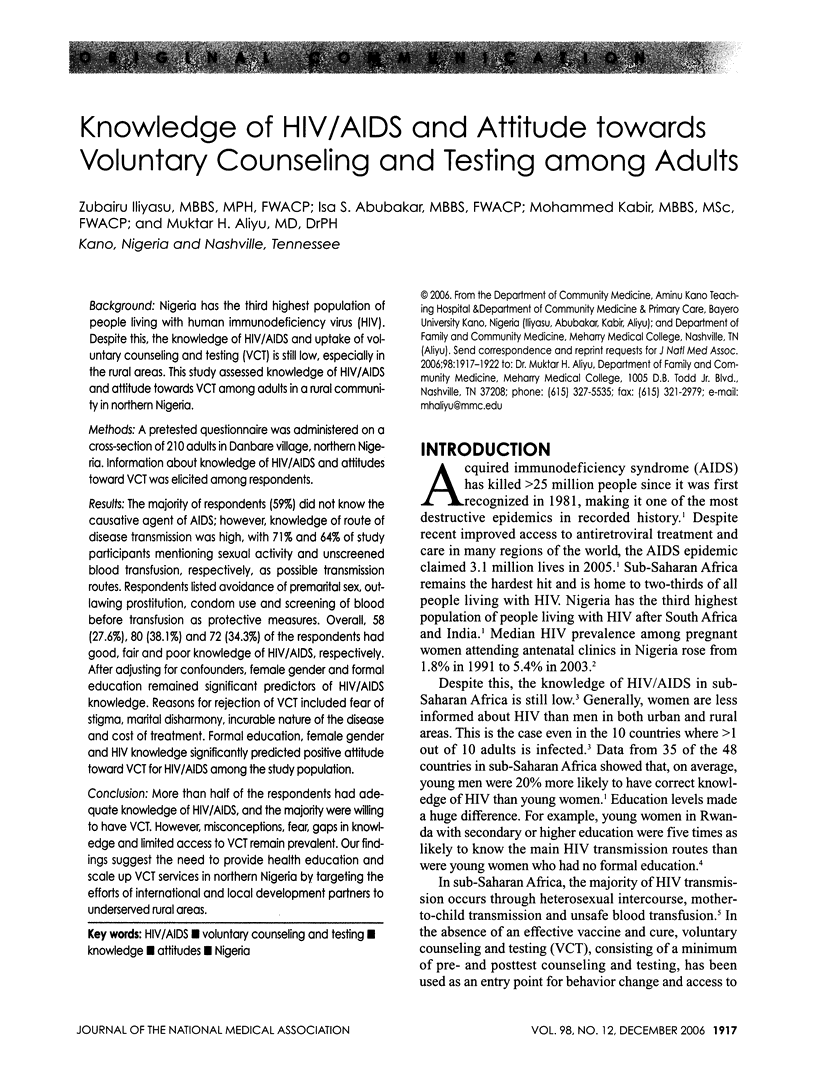
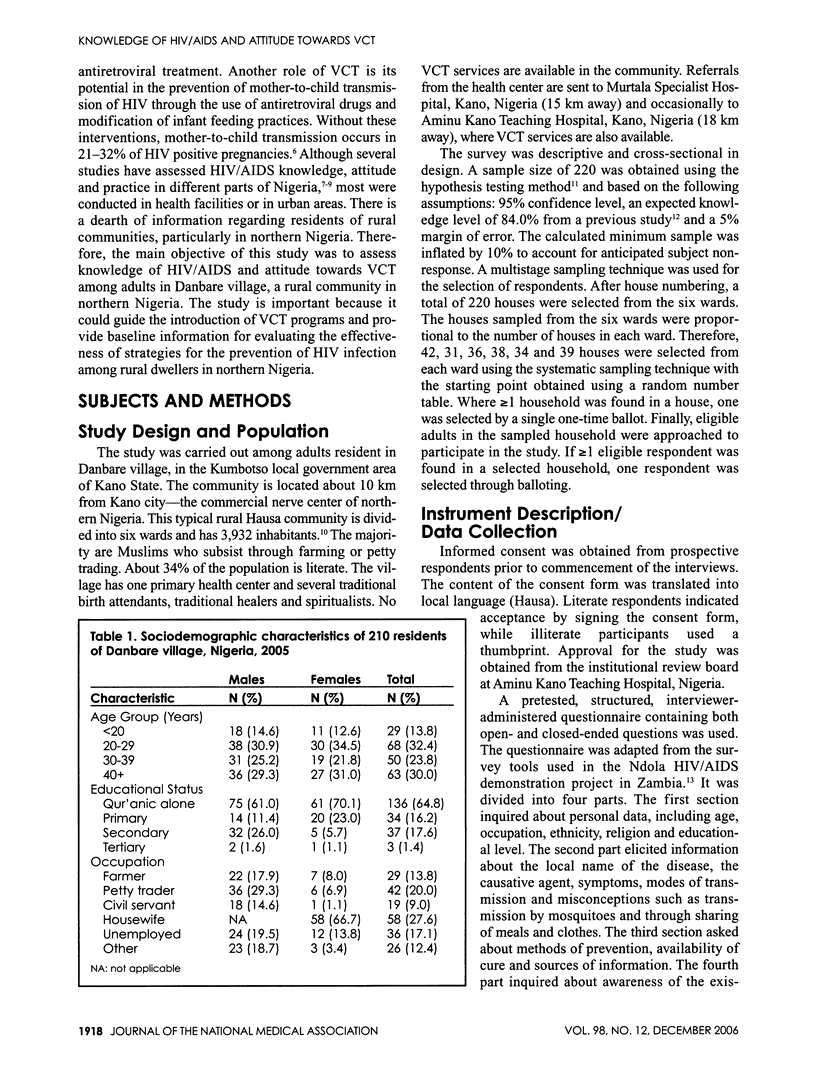
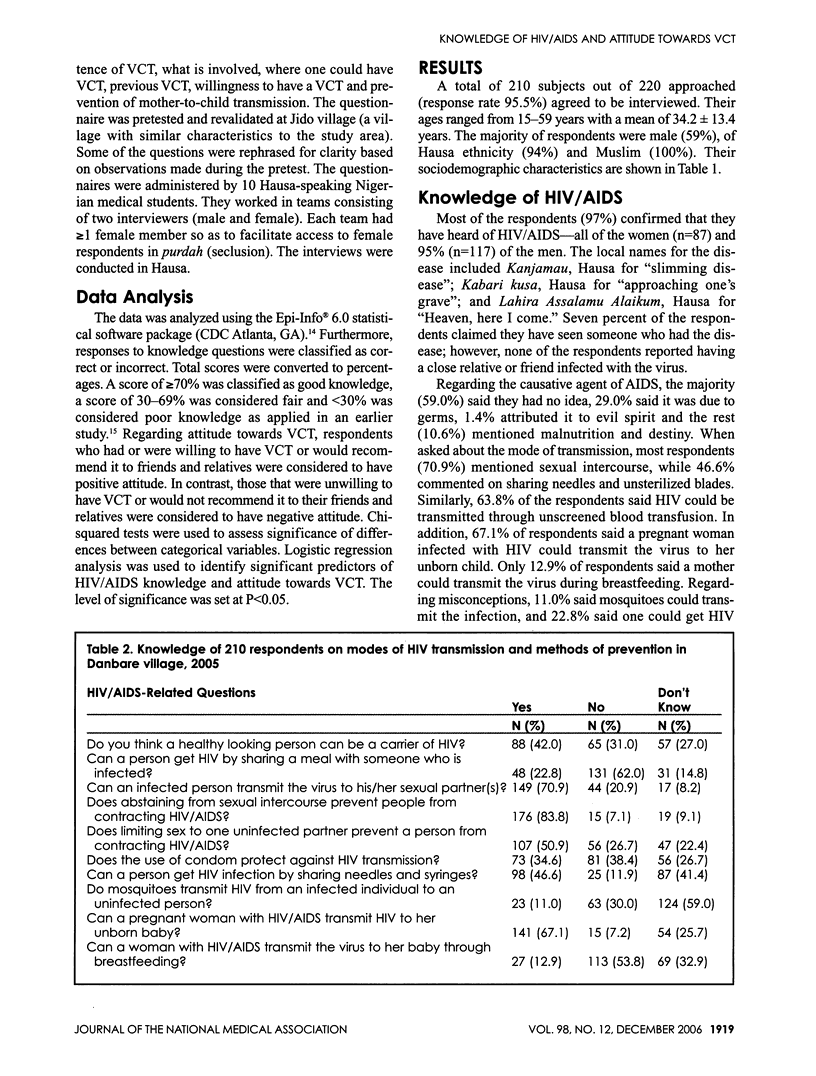
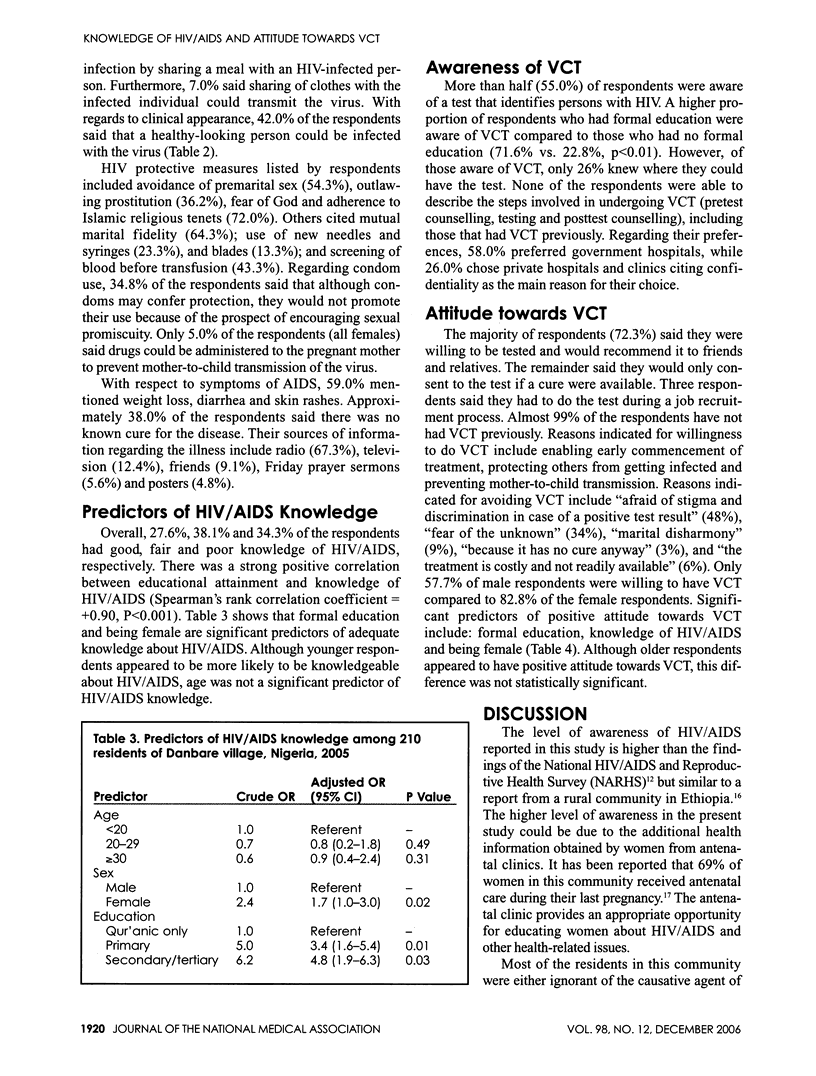
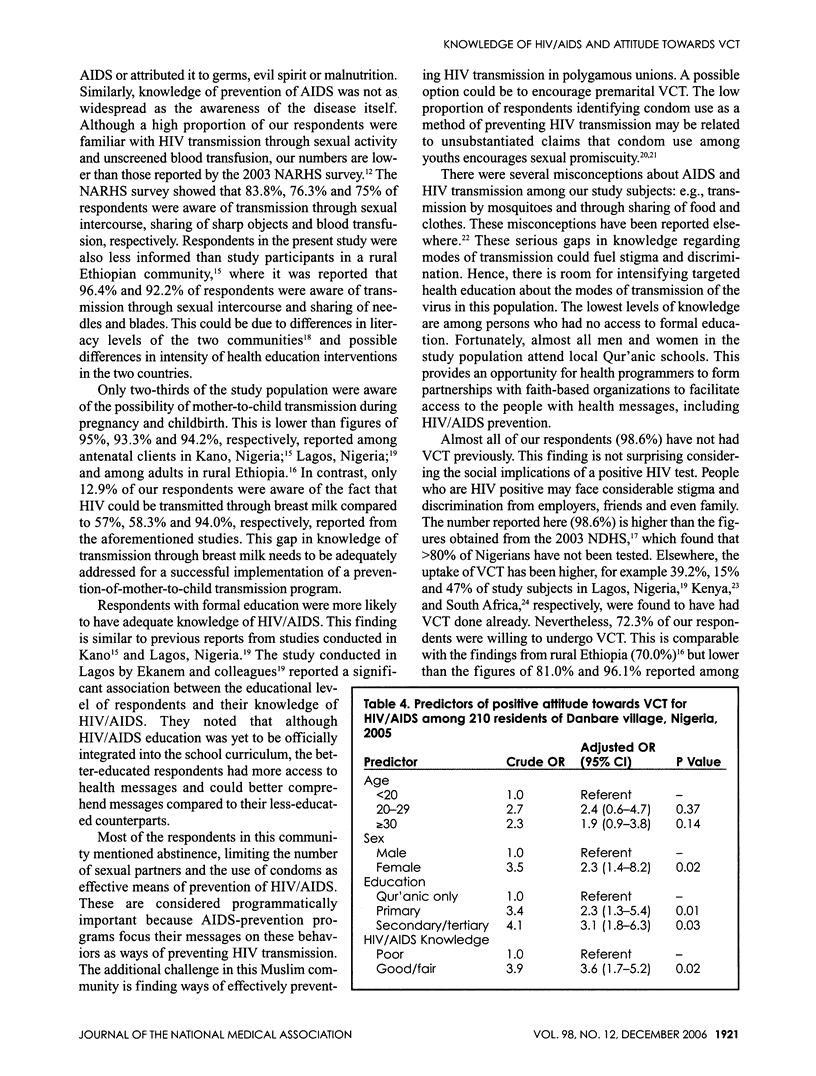
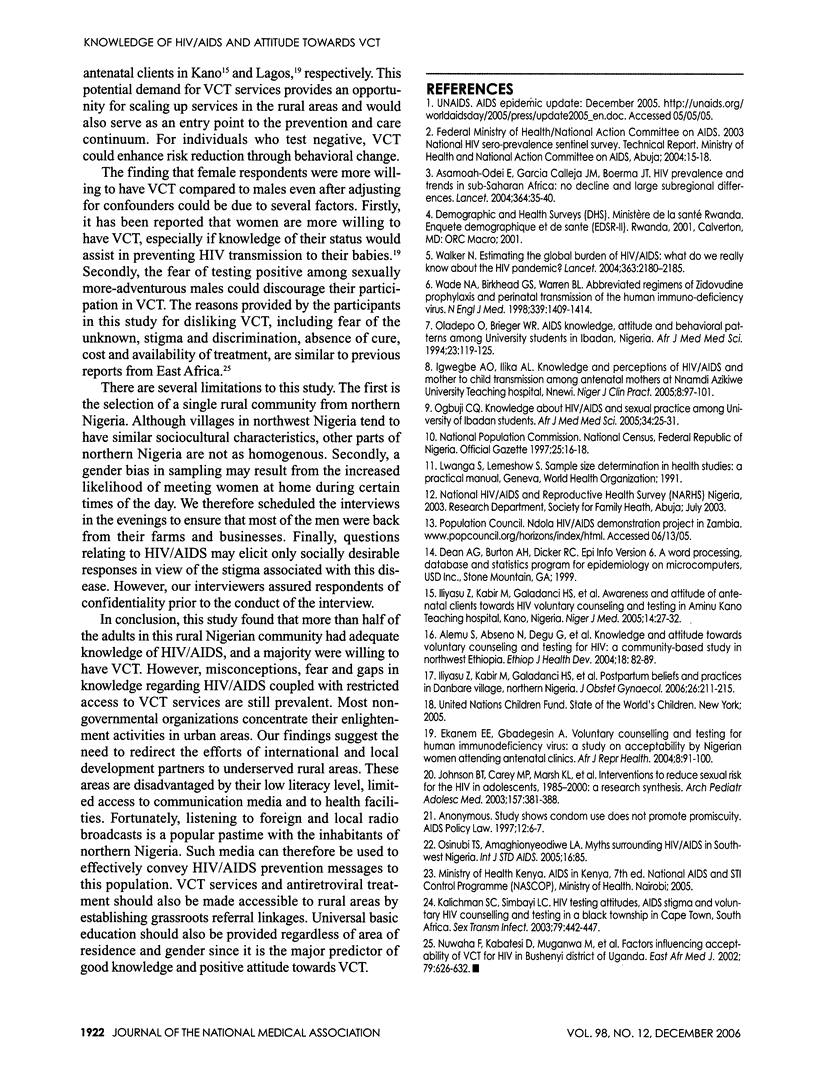
Selected References
These references are in PubMed. This may not be the complete list of references from this article.
- Asamoah-Odei Emil, Garcia Calleja Jesus M., Boerma J. Ties. HIV prevalence and trends in sub-Saharan Africa: no decline and large subregional differences. Lancet. 2004 Jul 3;364(9428):35–40. doi: 10.1016/S0140-6736(04)16587-2. [DOI] [PubMed] [Google Scholar]
- Ekanem E. E., Gbadegesin A. Voluntary counselling and testing (VCT) for Human Immunodeficiency Virus: a study on acceptability by Nigerian women attending antenatal clinics. Afr J Reprod Health. 2004 Aug;8(2):91–100. [PubMed] [Google Scholar]
- Igwegbe A. O., Ilika A. L. Knowledge and perceptions of HIV/AIDS and mother to child transmission among antenatal mothers at Nnamdi Azikiwe University Teaching hospital, Nnewi. Niger J Clin Pract. 2005 Dec;8(2):97–101. [PubMed] [Google Scholar]
- Iliyasu Z., Kabir M., Galadanci H. S., Abubakar I. S., Aliyu M. H. Awareness and attitude of antenatal clients towards HIV voluntary counselling and testing in Aminu Kano Teaching Hospital, Kano, Nigeria. Niger J Med. 2005 Jan-Mar;14(1):27–32. doi: 10.4314/njm.v14i1.37131. [DOI] [PubMed] [Google Scholar]
- Iliyasu Z., Kabir M., Galadanci H. S., Abubakar I. S., Salihu H. M., Aliyu M. H. Postpartum beliefs and practices in Danbare village, Northern Nigeria. J Obstet Gynaecol. 2006 Apr;26(3):211–215. doi: 10.1080/01443610500508345. [DOI] [PubMed] [Google Scholar]
- Johnson Blair T., Carey Michael P., Marsh Kerry L., Levin Kenneth D., Scott-Sheldon Lori A. J. Interventions to reduce sexual risk for the human immunodeficiency virus in adolescents, 1985-2000: a research synthesis. Arch Pediatr Adolesc Med. 2003 Apr;157(4):381–388. doi: 10.1001/archpedi.157.4.381. [DOI] [PubMed] [Google Scholar]
- Kalichman S. C., Simbayi L. C. HIV testing attitudes, AIDS stigma, and voluntary HIV counselling and testing in a black township in Cape Town, South Africa. Sex Transm Infect. 2003 Dec;79(6):442–447. doi: 10.1136/sti.79.6.442. [DOI] [PMC free article] [PubMed] [Google Scholar]
- Nuwaha F., Kabatesi D., Muganwa M., Whalen C. C. Factors influencing acceptability of voluntary counselling and testing for HIV in Bushenyi district of Uganda. East Afr Med J. 2002 Dec;79(12):626–632. doi: 10.4314/eamj.v79i12.8669. [DOI] [PMC free article] [PubMed] [Google Scholar]
- Ogbuji C. Q. Knowledge about HIV/AIDS and sexual practice among University of Ibadan Students. Afr J Med Med Sci. 2005 Mar;34(1):25–31. [PubMed] [Google Scholar]
- Wade N. A., Birkhead G. S., Warren B. L., Charbonneau T. T., French P. T., Wang L., Baum J. B., Tesoriero J. M., Savicki R. Abbreviated regimens of zidovudine prophylaxis and perinatal transmission of the human immunodeficiency virus. N Engl J Med. 1998 Nov 12;339(20):1409–1414. doi: 10.1056/NEJM199811123392001. [DOI] [PubMed] [Google Scholar]
- Walker Neff, Grassly Nicholas C., Garnett Geoff P., Stanecki Karen A., Ghys Peter D. Estimating the global burden of HIV/AIDS: what do we really know about the HIV pandemic? Lancet. 2004 Jun 26;363(9427):2180–2185. doi: 10.1016/S0140-6736(04)16511-2. [DOI] [PubMed] [Google Scholar]


